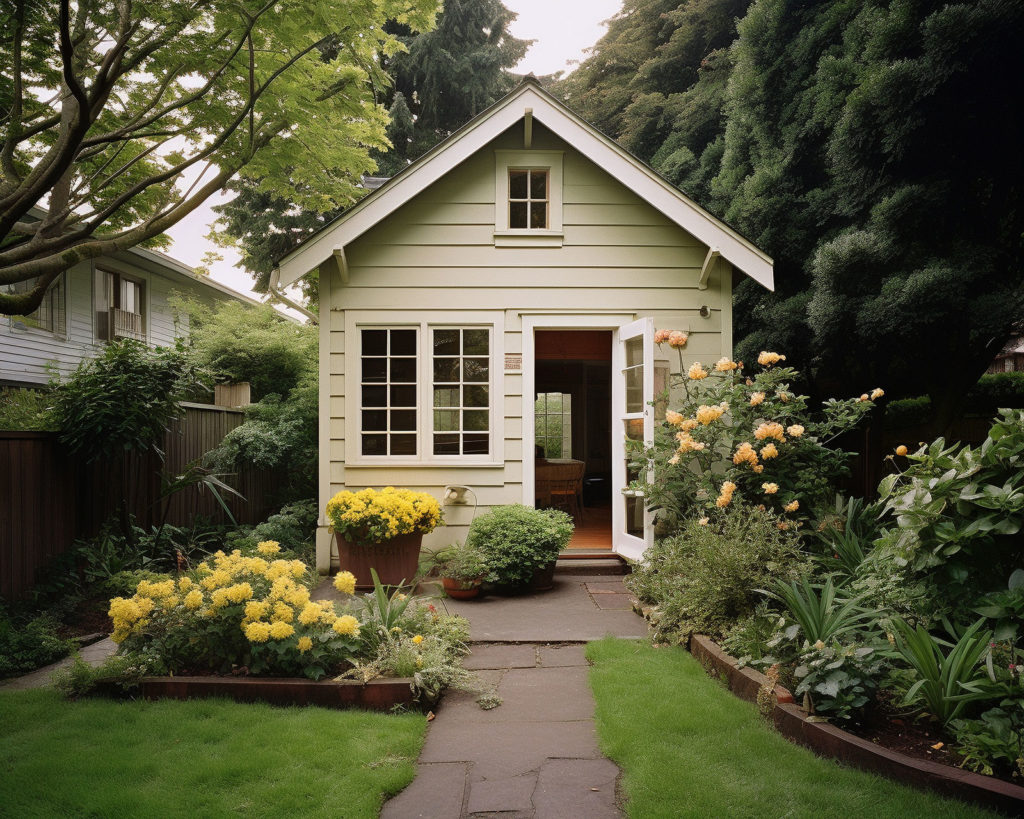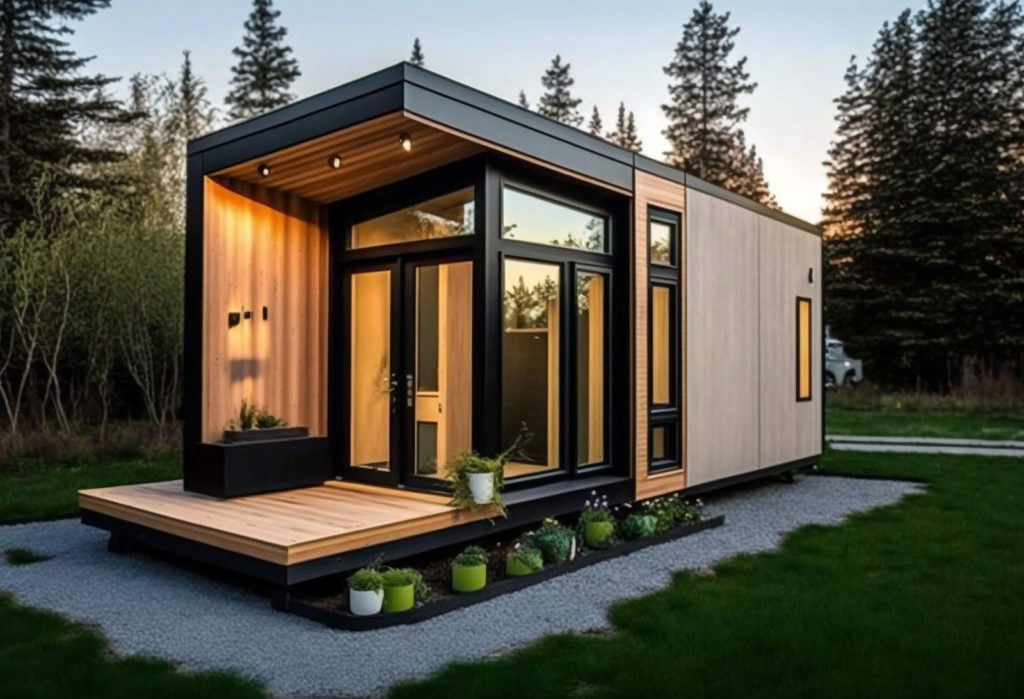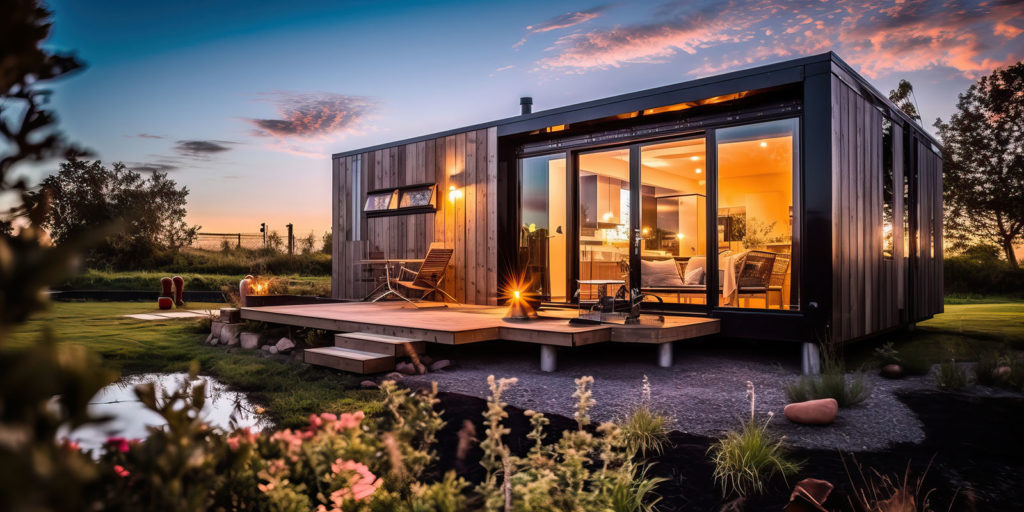Tiny homes have been gaining popularity across North America as a creative solution for affordable and sustainable living. In Vancouver, where the real estate market is notoriously pricey, more individuals are considering the tiny home lifestyle as a viable alternative to traditional homeownership. These compact dwellings offer a unique blend of functionality and eco-friendly design while providing the essential comforts of a traditional home, making them an attractive option for those looking to downsize or live within their means.
The concept of tiny homes revolves around the idea of maximizing the use of space and minimizing one’s carbon footprint. In Vancouver, a number of companies specialize in designing and building custom tiny houses to cater to a range of preferences and budgets. Some of these homes are built on wheels for added mobility, while others are designed as permanent residences or supplementary additions to existing properties. Regardless of their individual features, the ultimate goal of tiny homes is providing affordable, efficient, and sustainable living solutions in Vancouver’s competitive real estate market.
Key Takeaways
- Tiny homes are a popular solution to affordable and sustainable living in Vancouver.
- Custom designs and features cater to diverse preferences, budgets, and purposes.
- The tiny home lifestyle promotes efficiency, sustainability, and minimalism, making it an attractive alternative to traditional homeownership.

Tiny Homes Concept
Tiny homes have gained popularity in recent years, particularly in densely populated areas like Vancouver. They offer an innovative and budget-friendly alternative to traditional housing options, especially in a city where affordable homes are difficult to come by.
The principal appeal of a tiny home lies in its efficient use of space. Designers optimize these small abodes by incorporating multi-functional features and clever storage solutions. As a result, tiny homes often surprise people with their capacity to accommodate essential living requirements within minimal square footage.
In Vancouver, tiny homes have emerged as an attractive solution to address the city’s real estate shortage and skyrocketing prices. As mentioned in the Daily Hive, these compact dwellings have been listed for as low as $45,000, drastically reducing the barrier to homeownership for many residents.
To further illustrate the versatility of tiny homes, Vancouver’s local government has approved the construction of tiny homes for unhoused individuals. These 10 units will be built near an existing shelter and managed by a local non-profit organization.
The market for tiny homes extends beyond just Vancouver; companies like Dwell Tiny Homes on Vancouver Island offer well-crafted, affordable tiny homes for interested buyers. There is a growing interest from individuals who prefer an alternative lifestyle, where the focus is on minimalist living and environmental sustainability.
In summary, tiny homes provide a viable, efficient, and environmentally friendly solution to Vancouver’s housing challenges. As the concept continues to grow in popularity, it is expected that more people will embrace this unique approach to meet their housing needs while embracing a minimalist and sustainable lifestyle.
Tiny Homes in Vancouver
In recent years, tiny homes have been gaining popularity in cities like Vancouver, as more people search for creative and affordable living options. Often built on a trailer or small foundation, these compact homes can offer functionality and simplicity while being eco-friendly and requiring lower upkeep costs.
One of the appeals of tiny homes is the lower price point compared to traditional housing in Vancouver. It is not uncommon to find tiny homes for sale with prices starting as low as $45,000, providing a more accessible option in a city where real estate prices can be quite high.
Several tiny home communities have been established in Vancouver, such as the one in Rose Village, which features a cluster of these space-efficient houses. This type of living arrangement offers a sense of community and collaboration among residents, contributing to a more sustainable lifestyle.
Manufacturers and builders in the Vancouver area, like Mint Tiny House Company and CREST Tiny Homes, provide the necessary expertise in designing functional and comfortable tiny homes. These companies help potential buyers customize their compact living spaces to suit their needs and preferences.
| Pros | Cons |
|---|---|
| Affordable | Limited living space |
| Eco-friendly | May have zoning restrictions |
| Community living | Minimal storage options |
For those interested in exploring a simpler lifestyle, Vancouver’s tiny home market offers a unique opportunity to live in a vibrant Canadian city while remaining conscious of the environment and financial considerations.
Design and Layout
When it comes to designing a tiny home in Vancouver, it is crucial to maximize the use of limited space. To achieve this, thoughtful planning and intelligent layout strategies are employed. Designers typically integrate multi-functional elements, such as convertible and foldable furniture, to ensure that every inch of the tiny home is efficiently utilized.
The kitchen in a tiny home often features compact appliances and storage solutions to accommodate the essentials. Designers opt for space-saving designs like recessed storage and shelves and prefer cabinets that conserve floor space. For example, in tiny homes created by the Mint Tiny House Company, kitchens are carefully crafted to offer both style and functionality.
One key aspect of a tiny home layout is the bedroom. As a private and intimate space, it is important to have a comfortable bed. Depending on one’s preference, some tiny homes feature lofts for sleeping areas to conserve floor space. Alternatively, a convertible unit like a Murphy bed or pull-out sofa is an efficient choice that allows for multi-use space during the day.
In some tiny homes, a small den area might be included in the design, serving as a mini-office or study space. To optimize this area, wall-mounted desks and storage systems are commonly used to minimize floor usage.
The bathroom is another critical component of a tiny home, often designed to be compact and efficient. Regardless of size, it is essential to incorporate a toilet, sink, and shower. For instance, in trim studio’s Galiano 100 design, the bathroom is kept minimal yet fully functional.
To summarize, the design and layout of a tiny home in Vancouver are centered around maximizing space and functionality. Through clever planning, incorporation of multi-purpose elements, and selection of suitable furniture, it is possible to create a comfortable living space despite its small size.
Materials and Craftsmanship
When it comes to tiny homes in Vancouver, a key focus is the integration of quality craftsmanship and high-quality materials. This approach ensures that these homes are not only aesthetically pleasing but also durable and functional. Vancouver is home to several tiny home builders who prioritize the use of top-notch materials and skilled craftsmanship in their construction projects, such as Rewild Homes and Sunshine Tiny Homes.
These builders pay attention to detail in every aspect of the construction process. For example, they often use custom-designed quartz countertops that are not only visually appealing but also extremely durable. Quartz countertops resist staining, scratching, and chipping, making them an excellent choice for a tiny home that needs to withstand the challenges of everyday living.
Custom cabinetry is another aspect where tiny home builders in Vancouver do not compromise on quality. Made to maximize space and efficiency, these cabinets are designed and crafted with precision to ensure they fit perfectly within the limited space of a tiny home. By using high-quality materials like solid wood and hardware, custom cabinetry in these homes is not only beautiful but also built to last for years.
Moreover, the tiny home builders in Vancouver collaborate with licensed tradespeople who have extensive experience in their fields, ensuring that every aspect of the home is well-constructed. As mentioned by Dwell Tiny Homes, these homes are built in accordance with building regulations and industry standards, so homeowners can have the confidence that their investment is protected.
In conclusion, the combination of quality craftsmanship and high-quality materials used in constructing tiny homes in Vancouver ensures that these dwellings are stylish, functional, and built to last. Whether it’s sturdy quartz countertops or custom cabinetry, every detail is carefully considered to create a comfortable and sustainable living space.

Comfort and Luxury
Vancouver’s tiny homes are known for combining comfort and luxury in a compact living space. These homes pay special attention to the finer details, ensuring both style and functionality. One can find high-quality features like tall ceilings, large windows, and elegant doors, which contribute to a spacious and airy atmosphere.
The ceiling height in many Vancouver tiny homes is designed to create a sense of openness. Vaulted ceilings and strategically placed skylights make the space feel more expansive while letting in natural light. This design choice not only enhances the visual appeal but also ensures a cozy and comfortable living experience.
Windows and doors play a crucial role in enhancing the luxurious feel of tiny homes. Sustainable materials such as locally-sourced wood are often used to create beautiful and energy-efficient windows and doors. Additionally, these tiny homes are known for their unique sliding or folding door systems, which provide convenience and flexibility in space usage.
Owners of Vancouver tiny homes never have to compromise on style and luxury. Many of these homes feature high-end fixtures, sleek countertops, and modern appliances. In fact, a few tiny homes even manage to incorporate features like a soaking tub, adding to the overall sense of indulgence.
Here are some luxury elements often found in Vancouver tiny homes:
- Tall Ceilings: Vaulted ceilings or lofts
- Windows: Large, energy-efficient windows with wooden frames
- Doors: Sliding or folding door systems for flexibility
- Appliances: Modern and energy-efficient appliances
- Bathrooms: Luxurious soaking tubs
In essence, Vancouver’s tiny homes showcase how comfortable and luxurious living can be achieved within a small footprint. With an emphasis on style, sustainability, and functionality, these homes exhibit a perfect blend of design elements that cater to both the practical needs and aesthetic preferences of their occupants.
Storage and Space Optimization
In tiny homes, particularly in Vancouver, storage and space optimization play a crucial role in ensuring a comfortable and practical living environment. Innovative and creative solutions enable residents to make the most out of every square foot.
One technique to maximize storage space is to have multi-functional furniture. Choosing items like sofa beds, extendable dining tables, or coffee tables with hidden storage can save space while providing multiple uses. Additionally, some tiny homes in Vancouver, like the Galiano 100, incorporate storage loft areas, adding extra square footage without compromising the living area.
Vertical storage options should also be considered. Installing open shelves or floating shelves on walls optimizes space and reduces the need for bulky freestanding storage units. Moreover, utilizing the space underneath staircases or creating built-in storage cabinets can be highly beneficial for residents in tiny homes.
In the bedroom, optimizing the space under the bed for storage is an efficient solution. Specially designed bed frames with built-in drawers or even hydraulic lift-up beds can provide large amounts of hidden storage space. In a Vancouver micro-space conversion, a bedroom shared by a mother and daughter uses this storage technique to maintain an organized living space.
Lastly, it’s essential to maintain a minimalist approach as a tiny home dweller. Decluttering regularly and adopting a “less is more” mentality can significantly increase the usefulness of the available space. Remember to prioritize function over aesthetic, using practical and space-saving items that contribute to an organized and comfortable atmosphere.
By implementing these storage and space optimization methods, tiny homes in Vancouver can offer a comfortable and efficient living environment for those looking to simplify and downsize their lifestyles.
Sustainable Living
Tiny homes in Vancouver are becoming increasingly popular as a solution for sustainable living. These compact dwellings strive to reduce their environmental impact by using locally-sourced and high-quality materials, providing energy-efficient alternatives to traditional housing solutions. The growing trend of tiny home communities in Vancouver offers an eco-friendly and community-driven lifestyle to their residents.
Many tiny homes are designed with off-the-grid living in mind. This means they rely on renewable energy sources, such as solar panels and wind turbines, rather than conventional power from the grid. In addition, they have systems in place for water collection, filtration, and waste disposal, further reducing their ecological footprint. Not only do these features promote sustainability, but they also contribute to a sense of self-sufficiency and independence for homeowners.
Vancouver-based companies like Style & Grace Homes and Rewild Homes specialize in creating tiny homes that prioritize sustainability and adaptability. Their designs incorporate features such as:
- Energy-efficient appliances: Tiny homes often utilize smaller, more energy-efficient appliances, reducing energy consumption.
- Insulation: Adequate insulation helps reduce heat loss in winter and heat gain in summer, making the home energy-efficient and comfortable year-round.
- Natural lighting: Large windows and skylights provide ample natural light, reducing the need for artificial lighting during daylight hours.
Owning a tiny home in Vancouver, whether within a community or on a private property, presents a unique opportunity to embrace sustainable living. These compact spaces offer valuable lessons on the importance of resource conservation, while promoting a more mindful and eco-conscious way of life.
Plumbing and Power
When considering a tiny home in Vancouver, one important aspect is the plumbing and power systems. Most tiny homes are designed with a combination of off-grid and on-grid capabilities, providing homeowners with various choices for water, sewage, and energy management.
For water supply, many tiny homes come equipped with a 40-gallon freshwater tank and a 50-gallon black water holding tank. This allows residents to manage their water needs efficiently without having to rely on municipal hookups. Additionally, some tiny homes are designed to accommodate rainwater catchment systems, providing an environmentally friendly water source.
In terms of sewage, tiny homes can have a variety of systems in place. Some might have traditional plumbing systems that can connect to city sewer lines for easy disposal. Others may use composting toilets or chemical toilets that reduce the need for sewage hookups.
When it comes to power, tiny homes in Vancouver offer different options to homeowners. If staying on-grid is preferred, homes can be connected to the city’s electrical grid for a stable power supply. For off-grid living, solar panels and battery storage systems may be used to generate and store energy. Additionally, propane or natural gas appliances can be incorporated into the home’s design, providing efficient and eco-friendly heating and cooking options.
In summary, tiny homes in Vancouver provide a range of options for plumbing and power. These choices allow for both on-grid and off-grid living, and can be tailored to suit the homeowner’s specific needs and preferences, making the tiny home lifestyle accessible and appealing to many.

Exploring Further
In recent years, the tiny home movement has gained traction in Vancouver and surrounding areas. With escalating real estate prices and a desire to live more sustainably, many people are considering downsizing their living spaces. This section provides insights into the world of tiny homes in Vancouver.
Firstly, tiny homes provide an opportunity to live in harmony with nature. Minimalist living can reduce one’s carbon footprint, and many tiny home dwellers choose to incorporate eco-friendly features such as solar panels and rainwater collection systems. The outcome is a living space that is conscientious about its impact on the environment.
When it comes to mobility, tiny homes offer unparalleled flexibility. Many tiny homes are built on trailers, allowing owners to move their living space as needed. This freedom to relocate provides a unique advantage, especially for those whose work or lifestyle demands frequent travel.
With respect to value, as compared to traditional homes, tiny homes can be more affordable. A smaller space requires less material to build, translating into lower construction costs. Furthermore, minimal living spaces often result in lower utility bills, making tiny homes a more economical option for many people.
Vancouver is not alone in this trend; Victoria and other cities in British Columbia are also seeing increased interest in tiny homes. Companies such as Rewild Homes serve residents all over Vancouver Island, meeting the demand for eco-friendly, compact housing solutions. These builders work in collaboration with clients, designing and constructing custom tiny homes tailored to their needs.
Finally, it is essential to recognize the dedication of teams working within the tiny home industry. From knowledgeable designers to skilled craftsmen, these individuals collaborate to create innovative and sustainable housing solutions for future generations of home buyers in Vancouver and beyond. Their expertise and commitment are critical in shaping this burgeoning housing sector.
Frequently Asked Questions
Are tiny homes legal in Vancouver BC?
What are the top tiny home builders in British Columbia?
How much does a tiny house cost in Vancouver?
Where can I find used tiny homes for sale in BC?
What are some prefab tiny home options in BC?
